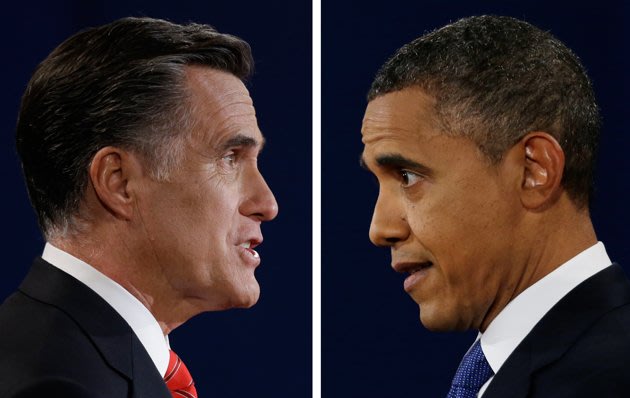Romney goes on offense against subdued Obama in first debate
By Chris Moody, Yahoo! News | The Ticket – 18 hrs agoFaced with several recent polls showing Romney falling behind, the GOP candidate may have bought himself some added time after Wednesday's debate, where he appeared on the offensive against Obama. Romney's answers to questions from the moderator, Jim Lehrer of PBS Newshour, who played a subdued role over the course of the evening, were crisp and appeared well-rehearsed. His responses included as many specifics as the limited time would allow, and Romney seemed to hit his marks in a way Obama was not able to.
The "zingers" promised for the debate were scarce, and both instead used their time to carefully outline ideas for how they would govern. Romney and Obama used personal examples to supplement their points.
In perhaps the most anticipated moment of the debate, Romney survived the session on health care reform, which could have been a major liability for the Republican nominee. As governor of Massachusetts, Romney championed a state health care law that later became the partial blueprint for Obama's national health care overhaul that Romney now says he wants to repeal. During the debate, Romney worked to show the difference between the two laws, while Obama aimed to tie them together. Obama scored points in noting that many of the ideas that made it into the final health care law originated with with Republicans, but Romney escaped the exchange with only minor wounds.
"There's a reason why Governor Romney set up the plan that he did in Massachusetts," Obama said. "It wasn't a government takeover of health care. It was the largest expansion of private insurance."
Although the debate began awkwardly with both candidates discussing the president's 20th wedding anniversary, the contest quickly moved into what at times became a tense conversation that showed the difference between their competing visions for the future of the country and the role of government. But for much of the first part of the contest, both Obama and Romney spent a lot of time working to fact check the other.
Obama launched an early attack on Romney for proposing a tax plan that cuts federal government programs but does not include tax increases on the wealthy. He knocked the former governor for not providing specifics about his own plan for tax reform and said his initiative would raise taxes on middle-income families by $2,000 and lower them for millionaires.
"Virtually everything he just said about my tax plan is inaccurate," Romney shot back, adding that he doesn't intend to raise taxes under his plan.
Obama pressed that there was no way to achieve sound deficit reduction without what he called a "balanced approach" that includes tax increases and spending cuts, forcing Romney to double down on a policy against raising taxes under any circumstances.
The debate, which lacked the contentious moments of the Republican primary contests, marked nearly five years since Obama and Romney have seen each other in person. Both men, however, have studied the other from afar through campaign ads, briefing books and tapes of old debates during preparations for the big night.
For some voters, Wednesday's debate was Romney's first real opportunity to make an impression. As the challenger, Romney was tasked with showing voters what distinguished him from the president and his policies, and how his own ideas would make the country better off. The debate also offered the Republican nominee an opportunity to display his personality, which at times can appear stiff or halted when portrayed in news coverage.
In a way, Obama faced an even deeper challenge. After four years under his watch, the unemployment rate remains above 8 percent and the national debt now tops over $16 trillion. Indeed, the president inherited a post over a nation facing one of the deepest recessions in recent history, but Obama had to make the case that his policies were the right ones without merely saying "it could have been worse." If the end of his first term is a performance review and the debates are his time to make a defense, it's crucial for him to hit his marks.
In a race in which more than 90 percent of the electorate has already made up their minds, both of the candidates' remarks over the course of the debate were intended for the ears of the few, albeit powerful, undecided voters living in swing states. Each in their own way made pitches to these prospective supporters, while still giving confidence to their respective bases that they would not veer from their principles.
National polls show the race for the popular vote is at a near dead-heat just a month before the election, but an examination of surveys conducted in battleground states suggest Romney could face a deficit of support in areas he must win to best the president.
Wednesday night Romney made a solid first step.
The candidates will face each other twice more before Election Day, for a townhall-style debate in New York on Oct. 16 and a final contest over foreign policy in Florida on Oct. 22.

No comments:
Post a Comment